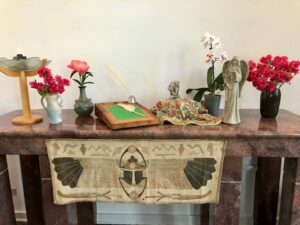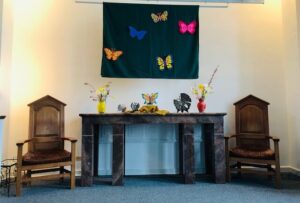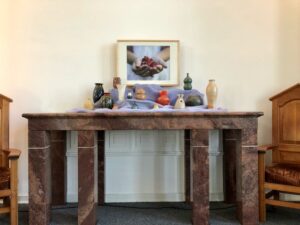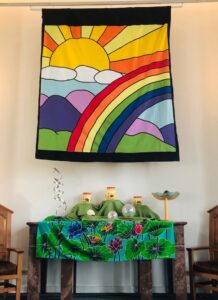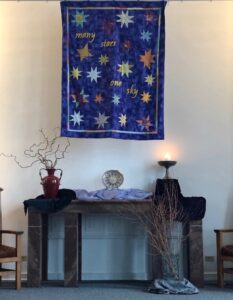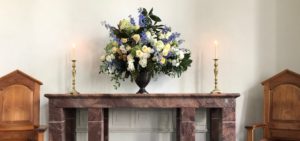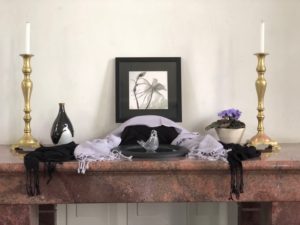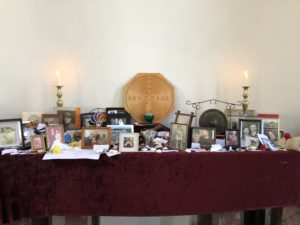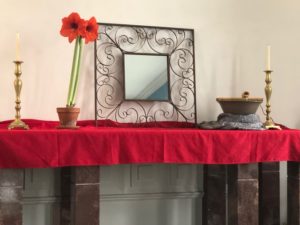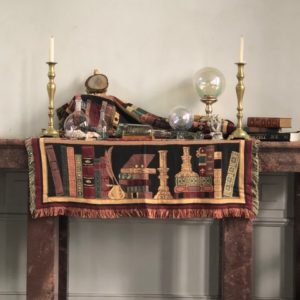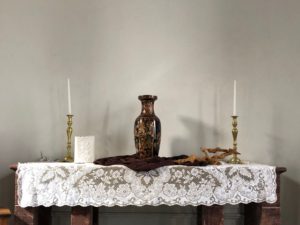The theme of our worship reflection this month is Transformation. So, I picked the poem about the spider weaving its web because it has many images of transformation. Erik read the poem to the children, and it is also printed in your order of service so you can post it on your fridge or share it with someone who isn’t here today.
PASTORAL CAVEAT
I want to acknowledge from the outset that spiders are quite scary to some people. You might be a person who goes the other direction when you see a spider. You might be a person who would take the long away around in instead of going through a door which had a spider web in it. Fear of spiders is a very real thing. So if you are one of those people, please bear with me as I use this metaphor of spiderwebs in the sermon today.
WHAT IS A SPIDER WEB?
Once I was on a walk through the woods with a group of people, I witnessed something that I found very touching. We were walking along chatting, when a young man in our group stopped us and asked us to wait while he moved a spider web out of the pathway. I said, “What?” Sure enough, he pointed it out, and when I looked carefully, I could see the threads shimmering in the sunlight and the spider in the center. Then, as if he were carefully unpinning laundry from the clothesline, he grasped an upper and lower strand on the left side and drew it back, like opening a magic door. The rest of us walked through. Then, he neatly reattached the sticky threads where they had been on the branches of the bush at the edge of the path. During this whole process, the spider sat in the middle of the web. I looked in amazement at the young man, and he explained, “I’m just trying to respect its home.”
Yes, a spider web is a home, and it is also a grocery store, of sorts! J It is the place the spider gets its food. The spider is catching insects. A spider web is an active field. A live creature is interacting with other live creatures in the universal process of finding nutrition. The spiderweb is full of possibility.
WHAT IS A COBWEB?
By contrast, what is a cobweb?
By most definitions, a cobweb is a spider web that has been abandoned. And that’s the definition I am using today, although apparently a cobweb can also mean a tangled, three-dimensional spiderweb, which is very unlike the circular, woven spiderweb in the poem.
I have some friends who live on a farm where they can their own food. Each fall, they fill the jars with the tomatoes, applesauce, and pickles, and then take boxes and boxes and boxes down the narrow stairs to the cool, damp cellar. Then, as winter goes by, they retrieve a jar whenever they are ready to eat it. One day, I was helping with the cooking and went down to the cellar, and in the dim light I finally found the tomato sauce way on the bottom shelf, way in the back corner. When I emerged back into the light of the kitchen, we all laughed at how my clothes had picked up wisps of cobwebs all over. Getting them off was sticky business.
COMPARISON:
So, to offer a comparison:
Spiderwebs are fresh and taut.
Cobwebs are crumpled and limp.
Spiderwebs are shiny.
Cobwebs are dull.
Spiderwebs span across spaces that we human also move in—doorways, pathways.
Cobwebs are in corners, attics, basements, underneath furniture.
Spiderwebs are to be cleaned around, in my opinion.
Cobwebs are to be cleaned up.
Spiderwebs serve a purpose.
Cobwebs are past serving a purpose.
Spiderwebs are made useful by waiting until food is caught.
Cobwebs are past the time of useful waiting.
SPIRITUAL QUESTION
And so my question today is: how can we see the spiderwebs and cobwebs in our lives?
WHICH IS WHICH?
I think there are things in this life that sometimes stick around too long.
For example,
Jobs that had meaning once but are not the right fit for us any more.
Beliefs that don’t serve us.
Friendships that aren’t healthy anymore.
Grief that isn’t processed.
Congregational systems that are out of date.
National laws that don’t make sense anymore.
Many of these things were great at first. They did serve a purpose. But realizing that they have become cobwebs can be uncomfortable. Cleaning under the furniture can be awkward.
What is the solution? I suggest that just like the young man in the forest, that we need to look closely. Examine. We need to ask ourselves: Is there still life there? Is the waiting a healthy waiting? If not, we have an opportunity to be actively aware of ending things. Once you discover that something in your life has become a cobweb, allow yourself the compassion to clean it up. That might mean taking time, but it can open new spaces and freedom.
That is much easier to say than to do. In fact, there are times when our economics or family situations mean that we simply have to live with an outdated situation for a while. If so, we have the opportunity to be compassionate and honest with ourselves about that truth, instead of pretending. Our souls find much more ease when we acknowledge that our situation is not life-giving, and that we are waiting for new life when it is ready.
EAT YOUR MISTAKES
But in addition to cleaning up the cobwebs in our lives, there is a subtle distinction I would like to make.
Recall the line in the poem that says “Eat your mistakes.”
Eat your mistakes?
Out of context, it could sound cruel, like a taunt.
But in this context, I find it beautiful. Here is the science behind it: Many spiders actually do eat their own webs daily. Because the web has holes where insects were caught, or debris where other things settled, the web needs to be refreshed. The protein in the silk provides nutrients that are then digested and re-used in the silk for the next web. I think the spider should get a gold star for reducing, reusing, and recycling!
So here’s my question for us: do we need to eat our own webs?
Sometimes when we have been hurt, or have hurt others, we might have a tendency to move on without looking back. But, insteaad, we would be wise to look at the tear in the relationship and see what could be learned. In this way we let the past nourish our future.
As a second example, We can also think of a congregation like a spiderweb. All congregations face changes that leave tears in the fabric, and all congregations accumulate habits that become burdensome. Many examples are found in the UU World magazine, which is mailed to all members. This magazine lifts up insights from UU congregations around the world. Any congregation has a chance to let the past be nourishment for the future, just like the spider does. Any organization has an opportunity to absorb what happened and then move on to build new things.
Similarly, there are broken places in the history of our country. The treatment of native americans and blacks here in Central Virginia is an often untold history. Tell about recent religious education family trip to Jefferson School. But, we can rise to the occasion to look at what happened, and tell the stories. We can digest, and then build something fresh from our insights.
My friends, today we have a lesson from the spider and its web. The spider knows that change is inevitable. We humans sometimes forget that. But, we do not have to be at the mercy of change. We can be a partner in the change process in life. Our outer environments are constantly changing, and inside, our bodies are constantly changing on a cellular level. The process of deconstruction and reconstruction is natural and on-going.
As we live through this process, the subtleties might evade us. So, sometimes it can be helpful to name the change outloud. In our congregation, as part of our pastoral care, church members volunteer to be on the Pastoral Visitors team. The Pastoral Visitors get training in active listening and sensitivity to life transitions. They meet regularly to check in with the minister confidentially. They show up to listen to other church members who are going through a challenging situation such as major illness, loss of a loved one, job loss, or any other thing that leaves a person at loose ends. I would like to ask right now any Pastoral Visitors who are present to please stand.
And if anyone is wanting to volunteer to be a pastoral visitor, please come to our next information session on July 6.
And so my friends, as this month of April closes, as the heat of summer sets in, as the school year winds down, as we finish the first 100 days of this US presidency, as our hearts breaks, as our hearts heal, as we wake up each morning, do our work, and rest each night, may we have a healthy cycle in harmony with life’s circles, and live fully into our potential.
Blessed be.
Amen


